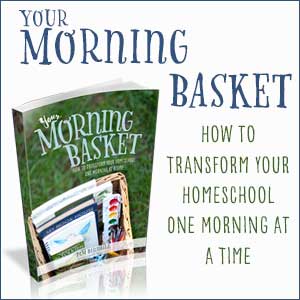Ah, those early years of homeschooling - I remember them well!
Brightly colored worksheets, hands-on learning, baking soda volcanoes, salt maps, field trips, LEGOs, read alouds, and lots and lots of drawings -- it was family learning at its finest.
But at some point there comes a time when your child does need to start becoming a bit more of an independent learner; not because you’re getting tired, even though that might well be the case. But because as they grow, it’s necessary that two things begin to happen:
They take ownership of their own learning, and
They begin to develop personal time and life management skills.
In other words, they need to learn to navigate the middle school “magic years.”
(This post contains affiliate links. Please see my disclosure policy for full details.)
I know that most of us have heard friends and peers talk about middle school with a bit of a sigh and even perhaps some rolling of the eyes. They, of course, are referring to the awkward and frustrating episodes that occur while children transition from childhood to the precipice of adulthood.
True, there are a myriad of hormonal and physical changes going on that lend themselves to making communication with ‘tweens’...um, challenging, to say the least.
Homeschoolers have the added privilege and opportunity to not only help our kids walk through this emotional minefield, but also prepare them educationally for their futures.
Yet, with a bit of help, “Yes, Virginia, the middle school years CAN be magic!”
So what’s a homeschooling parent to do?
Patience, understanding, deep-breathing techniques and a trusted friend-who’s-willing-to-be-a-sounding board will go far in helping you, mom and dad, get through these years.
As far as your role as a teacher goes, let me suggest four nuts-and-bolts ideas that can help your middle schooler successfully transform her own learning process, as well.
Teach them to use a planner.
I know, I know, planners aren’t for everyone. And there’s no guarantee they’ll use one for the rest of their lives. But right now, we’re just dealing with it as an educational tool. It does help to “see” where the time goes. It helps to be able to visualize how long class is, when mealtimes are, how long chores will take. If you also block in time for video games and recreation, they’ll get to see how the passing of time plays tricks on us when we’re having fun. You can have them schedule blocks ahead of time for both study and play, and then record actual time spent on both, and let me tell you…that’s a lesson right there!
Encourage them to use familiar materials, but help them dig deeper.
Are you a fan of unit studies? Lap-books? On-line learning? Whatever you’ve been doing in the elementary years, try one or two of those same types of materials; but instead of working side by side, give a portion of it as an assignment. This introduces independent study and self-paced learning, and helps them stay accountable to you for feedback. Just watch closely that they’re not dragging projects out unnecessarily long. (Make good use of that planner here.) Remember, this is a new skill, and right now what’s even more important than the subject matter is mastering the concept.
Introduce another teacher or two to the mix.
Middle school may be the best time to introduce a new teacher, someone other than mom. Of course, you still want to be closely involved, but you may be finding parent-child struggles spilling over into the teacher-student relationship. Using another parent, or tutor, or co-op leader, or even a grandparent to cover a subject or two may diffuse some of that tension, allowing you to be “mom” while they’re needing your emotional support.
Encourage working together in peer groups.
If you haven’t been doing this yet, this is a great time to find some sort of discussion group or learning activity with peers. Again, this may be under veiled parental supervision - middle schoolers hate to be treated like “babies”. But middle schoolers are at the stage where they’re beginning to be aware of concepts outside themselves. Giving them the opportunity to discuss topics that concern them helps develop group discussion skills and allows them to explore a whole different type of learning process. Classes taken at a local homeschool co-op are a great resource for this.
 Veteran homeschooler Pat Fenner feeds her passion for encouraging and inspiring homeschooling moms by writing at her blog PatAndCandy.com. Catch her excitement about parenting and homeschooling middle and high-school-aged young people when you subscribe to their site. You’ll get periodic practical and creative helps for that age, as well as unlimited access to a growing collection of “subscribers’ benefits”.
Veteran homeschooler Pat Fenner feeds her passion for encouraging and inspiring homeschooling moms by writing at her blog PatAndCandy.com. Catch her excitement about parenting and homeschooling middle and high-school-aged young people when you subscribe to their site. You’ll get periodic practical and creative helps for that age, as well as unlimited access to a growing collection of “subscribers’ benefits”.
More thoughts on the Middle School Years
________________________________________________
 Veteran homeschooler Pat Fenner feeds her passion for encouraging and inspiring homeschooling moms by writing at her blog PatAndCandy.com. Catch her excitement about parenting and homeschooling middle and high-school-aged young people when you subscribe to their site. You’ll get periodic practical and creative helps for that age, as well as unlimited access to a growing collection of “subscribers’ benefits”.
Veteran homeschooler Pat Fenner feeds her passion for encouraging and inspiring homeschooling moms by writing at her blog PatAndCandy.com. Catch her excitement about parenting and homeschooling middle and high-school-aged young people when you subscribe to their site. You’ll get periodic practical and creative helps for that age, as well as unlimited access to a growing collection of “subscribers’ benefits”.


No comments:
Post a Comment